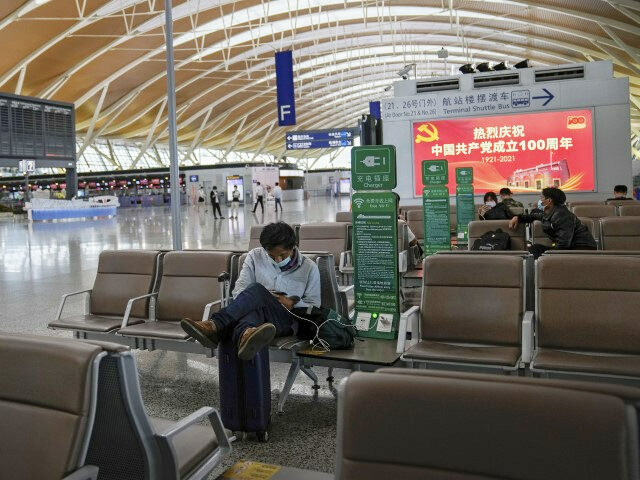The Wall Street Journal (WSJ) reported on Thursday that the flow of tourists and business travelers to China has slowed to a trickle, even after the much-touted “reopening” from coronavirus restrictions last winter.
The collapse in tourism is stunning and it seems to be getting worse, which is very bad news for China’s sputtering economy:
Foreign travelers’ absence is particularly evident in major cities like Beijing and Shanghai, where the numbers of foreigners who visited in the first half of the year totaled less [sic] than a quarter of comparable figures in 2019, before the Covid pandemic.
Nationwide, just 52,000 people arrived to mainland China from overseas on trips organized by travel agencies during the first quarter, the latest period for which national data is available, compared with 3.7 million in the first quarter of 2019. As in past years, nearly half of the visitors came from the self-ruled island of Taiwan and the Chinese territories of Hong Kong and Macau, rather than farther-away places like the U.S. or Europe.
“The number of visitors from Europe, America, Japan and Korea are all dropping, substantially,” said Xiao Qianhui, a director with the semiofficial China Tourism Association in a speech in May.
The problem goes far beyond the loss of tourism income, as the WSJ noted foreign investment is plunging as well, dropping to $20 billion in the first quarter of 2023 from a high of $100 billion in the first quarter of 2022. This would suggest the reduction in travel includes businesspeople and investors who no longer feel the need to visit China to negotiate deals.
Several business travelers and tourists who were once fond of visiting China told the WSJ they no longer felt welcome, due to rising “anti-Western” and “anti-American” attitudes, plus menacing behavior from Chinese government officials.
One travel agent cited Chinese police raids on Western financial firms in March as a reason business travelers became nervous. Those raids mostly involved arresting Chinese nationals who worked for foreign corporations, but they still sent a chilling signal to overseas investors at the very moment China was trying to woo them back after the coronavirus lockdowns.
One business executive said he was nervous about returning to China after publicly criticizing the Communist regime because he was more fearful that the paranoid government and its vast army of social media operatives might have noticed his comments and planned to retaliate against him.
In a similar vein, the WSJ said Chinese expatriates have become considerably more hesitant to return home, and dissidents who once felt it was safe to live in relatively open and cosmopolitan cities like Shanghai and Hong Kong have decided to move overseas.
“People now perceive China as very distant and somewhat alienated. It was exactly the opposite four years ago, when China was really open and vibrant, a must-go place,” sighed investment consultant Alexander Sirakov.
Only a week ago, Bloomberg News cited upbeat predictions that China’s tourism market would rebound to 90 percent of its pre-pandemic levels thanks to “surging demand” reported by Chinese officials. The much more dour WSJ piece, with its documented reductions of 75 percent or more in tourism, suggests Chinese officials were being less than honest with foreign journalists when they claimed the demand for tourism was “surging.”
Another Bloomberg News piece in July noted that tourists from China have not bounced back as expected, either. The article noted that not a single one of China’s favorite tourism destinations has returned to 50 percent of its pre-pandemic traffic; Indonesia comes closest at roughly 40 percent, while bookings to Thailand are only ten percent of normal.
The article noted several factors for cratering Chinese tourism, including reduced flight capacity, young Chinese losing interest in group tours, anxiety that the Chinese government might ban travel to other countries in a fit of pique and scuttle expensive vacation packages, and above all the declining Chinese economy.
Bloomberg’s analysts were so convinced that Chinese tourism has permanently diminished that they suggested Southeast Asian vacation hotspots begin reaching out to alternative customers like India, which is “home to an increasingly affluent population with a bug to travel and a growing airline industry.”
“In May, Indian tourists outnumbered Chinese in Singapore, and numbers are surging in other parts of the region,” the article noted.
Reuters noted in May that even when Chinese tourists return to favored overseas destinations, they spend a good deal less money than before the pandemic. These tighter wallets have been noticed at domestic tourist destinations in China as well, where foot traffic picked up much faster than spending once the pandemic lockdowns ended.
“Domestic tourism revenue is forecast to be just 83% of 2019 levels, at 120 billion yuan ($17.4 billion), according to official estimates, suggesting consumers are opting for lower-cost trips,” Reuters said.

COMMENTS
Please let us know if you're having issues with commenting.